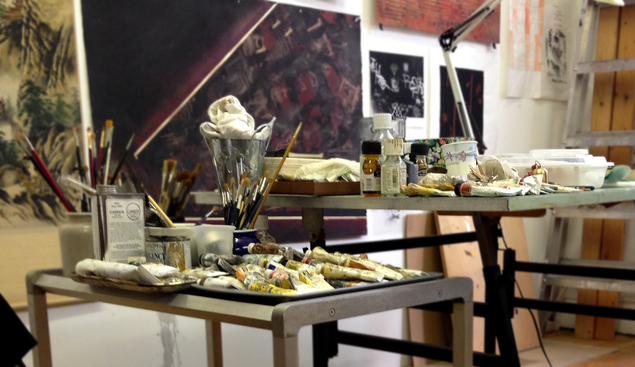 Tomie Arai is an Asian American artist based in New York. The media focus of her art practice is screen-printing; a process which allows her to apply illustrations to a range of surfaces in a complex manner. Arai creates layered assemblage, murals, sculptural objects, and installation environments. She pushes beyond trends of design and production that are synonymous with screen-printing by excavating culturally-laden topics, visually archiving oral histories, and employing marginal themes (as opposed to the mainstream and pop-art foils.)
Tomie Arai is an Asian American artist based in New York. The media focus of her art practice is screen-printing; a process which allows her to apply illustrations to a range of surfaces in a complex manner. Arai creates layered assemblage, murals, sculptural objects, and installation environments. She pushes beyond trends of design and production that are synonymous with screen-printing by excavating culturally-laden topics, visually archiving oral histories, and employing marginal themes (as opposed to the mainstream and pop-art foils.)
As she began to learn what it would take to become a dedicated artist, Arai, “gravitated toward workspace programs, and groups of artists.” She learned the craft of printmaking at at Robert Blackburn‘s workshop, working alongside a range of artists from all over the world. This format of working and learning within artist-directed spaces continued in her practice as she spent time at The Basement Workshop, (founded by Faye Chiang on Elizabeth street in New York.) She currently is exhibiting work at The Center for Book Arts. Developing her practice in this pedagogical manner allowed her to hone her skill in her own time – particularly at first, as a single mother. Her modes of working came out of the direct experience and inspiration from the people surrounding her. This also provided the opportunity for her to establish her own approach, in contrast to others, that was not stereotypical, or edition-centric. Rather then methodical she uses her screens in a much more extemporaneous form once she builds up a library of symbols around any given project.
In the 1990s Tomie was involved with the New York based network of Asian American artists called Godzilla. In their seminal act, they wrote a letter to the Whitney asking them to include more Asian American artists in their next biennial, and offered to facilitate studio visits from within their network. This group aided in propelling many artists careers who would have otherwise remained on the fringe. Arai points out that, “Local artists who were addressing (actually) very thorny issues, that the art world may or may not be interested in – are often over looked” in favor of more international artists with global appeal. Though commenting on a particular incident and intent – this could easily be said of the art world today.
She recalls her own original motivation to contribute positive images, hoping to correct damaging views of Asian Americans. “When I started making work there was maybe one book [laughs] containing an Asian American narrative, I think it was Woman Warrior. And when I started making murals on the Lower East Side there were no murals on the LES – and there was nothing, with the exception of Betty Friedan’s work, on women. So, telling these stories was really an important part of the process.” As time rolled on, she acknowledges that her own thinking about building Asian American aesthetic became mute as the narrative of the diaspora evolved. She notes the importance of 9/11 in that trajectory. “I think things are much more global now.” Yet, “I think there is even more of a greater need to look at what is local, and try and find within that the common thing that brings us all together.” She cites The Laundromat Project as an interesting space where the need for the artist in community in acknowledged.

“Wall of Respect for Women” c.1974 (Originally at East Broadway and Rutgers – this mural no longer exists.)
For many years Arai was heavily involved in public art, collaborating with students, and has gone on to collaborate with institutions on historic sites such as the African Burial Grounds in New York, the Japanese internment camp in Arizona, and is a visiting fellow at NYU’s Asian Pacific American Institute. Her sensitivity to story telling, the meaning behind symbols, and the broader power of the image in a pluralistic society coalesces in her gracious demeanor which allows her to engage in content that is of the most personal in nature – as it relates to identity and heritage. She sees herself as a teacher, and foremost a listener – having deliberately placed herself in collaboration with communities, outside the mainstream art-world.

“Each of these projects is unique, there is no formula. It is more about sharing knowledge.”
Artist Talk at the Center for Book Arts:
Tomie Arai: “Tales from Home”
THIS FRIDAY, March 8th , 6:30pm
…in conjunction with her exhibit of the same name
Jan 18 – Mar 30, Organized by Alexander Campos, Executive Director

Also on exhibition at the center…
Brother, Can You Spare a Stack
Jan 18 – Mar 30, Organized by Yulia Tikhonova
Candace Hicks: Fabrications
Jan 18 – Mar 30, Organized by Alexander Campos, Executive Director